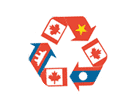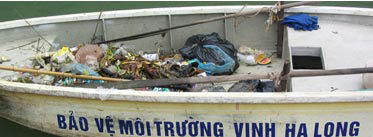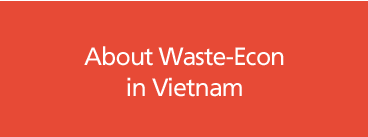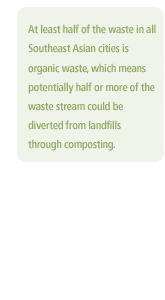



Waste-Econ has been working with our partners in Vietnam since July 2000. Our primary partner is the National Institute for Science & Technology Policy and Strategy Studies (NISTPASS), which is a leading research institute on sustainable development in Vietnam. We have also partnered with 4 Universities, 8 government agencies and one mass organization. For more details on these agencies, see our Partners and Personnel page.
Capacity Building Through Training
180 participants from waste management-related agencies have been trained during a six-week and six two-week training courses on the Waste Economy. Topics included solid waste management planning and technologies, research methodologies, economics of waste, public health and waste, industrial and hazardous waste. Many trainees from the original 6-week training course have gone on to teach in the 2-week training courses and two assistant instructors went on to teach part of the 6-week courses in Cambodia and Laos.
Our Vietnamese partners have developed an innovative undergraduate Integrated Waste Management curriculum for use in universities throughout the country. The curriculum, which was approved by the Vietnamese Ministry of Education in the spring of 2004, will now be available to all universities in Vietnam. Currently, a number of universities are offering programs that have incorporated Waste-Econ components into their courses.
Development of expertise in the waste-management field through graduate training at the University of Toronto - to date: 2 Master's completed; 2 Master's and 2 Ph.D.'s underway. All of the graduate trainees at the University of Toronto will be returning to their places of employment in Vietnam following their studies.
Formation of knowledge networks on waste economy among partner countries through newsletter distribution, joint meetings, workshops and teaching exchanges. Through international meetings and workshops, we have been able to build important connections between the partners in Vietnam and those in Cambodia and Laos. Our Vietnamese partners produce a newsletter (see News) semi-annually that is widely distributed throughout Vietnam. Connections have also been made during training courses and workshops between employees of various waste-related agencies.
EXPANDING RESEARCH CAPACITY THROUGH PILOT PROJECTS:
To help demonstrate some of the principles and benefits of Integrated Waste Management, we have undertaken five pilot projects across Vietnam, lead by Vietnamese research institutions. The projects are:
- Industrial waste management in Ho Chi Minh City, with a focus on the food processing industry and the potential for implementation of Cleaner Production practices;
- Industrial waste management in Ho Chi Minh City, with a focus on the food processing industry and the potential for implementation of Cleaner Production practices;
- Integrated management approach to on-shore and off-shore generated tourism waste in Ha Long Bay, a World Heritage Site;
- Implementation of a micro-credit scheme for female waste pickers and processors in Hai Phong; and,
- Education and health training for improving the livelihoods of child waste pickers in Hanoi.
HIGHLIGHTS OF VIETNAMESE PILOT PROJECTS TO DATE:
The pilot project team works with the local management board to conduct a Community Clean-up Day at Ha Long Bay, a World Heritage site, with great success. The people of Ha Long Bay have been very supportive of implementing any strategies aimed at better waste management in their community. Based on the feedback we have been receiving, our partners are now proceeding with plans for a composting demonstration site (using hotel wastes) and are working on an Integrated Waste Management strategy for the city.
Adoption of Cleaner Production (CP) processes by a seafood-processing factory in Ho Chi Minh City. Cleaner Production is the name given to changes in industrial processes that result in the reduction of waste or a change in the nature of the wastes that makes it less hazardous. Often implementing these changes can result in a significant cost savings in the long term for the company. The Frozen Prawn Factory in Vinh Loi, Bac Lieu Province, agreed to participate in the pilot project. They have undergone a full audit of their processes. Examples of the CP practices include the use of high-pressure hoses for cleaning the prawns and the use of pulverized ice instead of ice bars. Both practices produce significant water consumption savings. Once the analysis of the benefits of cleaner production is complete, the pilot project will organise a national workshop on cleaner production, using the Vinh Loi factory as a case study.
447 Micro-credit loans given to improve livelihood of female waste pickers and processors in Hai Phong - Current repayment rate is 100%. Through our Canadian partner, Gems of Hope, and the Vietnamese Women's Union, we have established a micro-credit program in Trang Minh Commune that focuses on waste-pickers and waste-processors, some of the most marginalized people in the village. Most of the loan recipients surveyed found that the loan funds helped by allowing them to accumulate waste longer before selling it, thus receiving higher prices per kilogram from selling in bulk. Through the program the women also receive basic training on saving, health and safety issues.
Reduction of school dropout rate through the development of educational support program for 76 "at risk" children living in a waste-picking community at Hanoi's dumpsite. Although Hanoi has now banned child waste pickers under the age of 16 at its landfill, many children are still finding ways to access the dumpsite and pick illegally. Many of the children who are doing poorly in school are tempted to drop out and look for opportunities to make money instead. Given the sparse opportunities in the local area, the easiest opportunity is waste picking. The Youth Research Institute has developed a program that assists these "at risk" students with their studies. Students who are able to complete their studies stand a better chance of escaping the poverty of waste picking. Studies are now following up on the longer-term success of this strategy.
